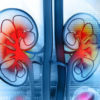Enlarged Prostate Treatment in Northern New Jersey
 An enlarged prostate is a urological condition that affects men as they age. Also known as benign prostatic hyperplasia (BPH), an enlarged prostate can cause urinary problems and pain that require treatment. Bergen Medical Associates provides urology services and other medical services to patients in northern New Jersey. We offer high-quality medical services, including enlarged prostate treatment. Learn more about enlarged prostate, its symptoms, and the treatments offered at Bergen Medical Associates.
An enlarged prostate is a urological condition that affects men as they age. Also known as benign prostatic hyperplasia (BPH), an enlarged prostate can cause urinary problems and pain that require treatment. Bergen Medical Associates provides urology services and other medical services to patients in northern New Jersey. We offer high-quality medical services, including enlarged prostate treatment. Learn more about enlarged prostate, its symptoms, and the treatments offered at Bergen Medical Associates.
What Is an Enlarged Prostate?
The prostate is a small gland found below the bladder and wrapped around the urethra in men. It helps produce semen and is an important component of the reproductive system. As males age, their prostates tend to get bigger — this is normal. However, some males develop a condition in which the prostate and surrounding tissues get swollen and painful. This is known as an enlarged prostate or benign prostatic hyperplasia (BPH). An enlarged prostate is not cancerous and does not increase a man’s risk of developing cancer, but it can cause symptoms.
What Are Enlarged Prostate Signs and Symptoms?
As the size of a man’s prostate increases, it can get large enough to press on the bladder or urethra and lead to symptoms. However, less than half of all men with enlarged prostates experience noticeable symptoms. These signs include:
- Difficulty with urination or inability to urinate (urinary retention)
- Trouble emptying the bladder
- Consistent urge to urinate
- Incontinence or leaking
- Pain with urination or bloody urine
- Slowed or delayed start of the urinary stream
- Strong and sudden urge to urinate
- Weak urine stream
Men older than 60 are more likely to have symptoms, but many times they are not severe enough to require medical attention.
What Are the Causes and Risk Factors of an Enlarged Prostate?
There are no specific causes of prostate enlargement, but it is thought to be related to hormone levels or cell changes in the testicles. However, certain risk factors can increase a man’s likelihood of having an enlarged prostate. These include:
- Age: Enlarged prostate glands become more common as patients age, with more than 90% of men over age 80 having the condition.
- Family history: Having a relative with benign prostate problems can increase a person’s chance of developing an enlarged prostate.
- Obesity: Being overweight or obese can increase a man’s risk of developing an enlarged prostate, but losing excess weight can decrease it.
Enlarged prostates are so common in older men that some experts say all men who live to a certain age will develop it.
How Is an Enlarged Prostate Diagnosed?
When a man over age 40 presents with pain or noticeable changes in their urinary habits, their healthcare provider will perform a variety of tests to determine if the problem is an enlarged prostate and to rule out other causes. A visit will typically begin with an overview of the patient’s medical and family history to gain insight. Then, a series of diagnostic tests will be performed, including:
- Digital rectal exam
- Prostate-specific antigen (PSA) blood test
- Urinary flow test
- Postvoid residual volume test
- Transrectal ultrasound
The provider may also order a urinalysis or urine culture to check for blood or infection in the urine. These tests help confirm or rule out an enlarged prostate as the cause of symptoms.
How Is an Enlarged Prostate Treated?
The treatment for an enlarged prostate will depend on whether the patient is experiencing symptoms and how severe they are. Treatment options include:
Watchful Waiting
Watchful waiting is a treatment option for patients with mild symptoms. The doctor will monitor the patient’s symptoms over time to see if they are improving or worsening. They may also take repeated tests to check for any changes in PSA or other levels.
Lifestyle Changes
Another treatment option for patients with mostly mild symptoms of enlarged prostates is to make lifestyle changes. Some of them involve getting healthier in general, while others consist of adjusting bathroom or eating habits. They include:
- Exercising regularly and eating nutritious foods to maintain a healthy weight
- Using the bathroom on a regular schedule to train the bladder
- Drinking less fluids before bed to reduce the urge to urinate during the night
- Practicing stress relief measures to reduce stress that can worsen symptoms
- Avoiding alcohol and caffeine, which may exacerbate symptoms
These actions can help decrease the symptoms patients experience.
Medicines
A treatment option for patients with moderate symptoms of enlarged prostates is medication. Certain medicines can help reduce symptoms, including:
- Medications to relax the bladder and prostate muscles and allow for easier urination
- Antibiotics to treat inflammation of the prostate
Other medicines that reduce levels of hormones produced by the prostate. They result in a smaller gland size and an increased urine flow rate.
Surgery
For patients with moderate to severe symptoms from enlarged prostates, surgery may be recommended. There are a few surgeries to help treat an enlarged prostate, and your healthcare provider can review all the best options to find the solution that will most work for you. Additionally, patients diagnosed with enlarged prostates should see their doctor yearly for an exam to make sure no changes have occurred.
Learn More About Enlarged Prostate Treatment Today
Patients with enlarged prostates or other urological conditions can access high-quality treatment and care at Bergen Medical Associates. Serving patients at several northern New Jersey office locations, Bergen Medical Associates has established a reputation for providing comprehensive and compassionate care. To learn more about enlarged prostate treatment options at Bergen Medical Associates, request an appointment today.










